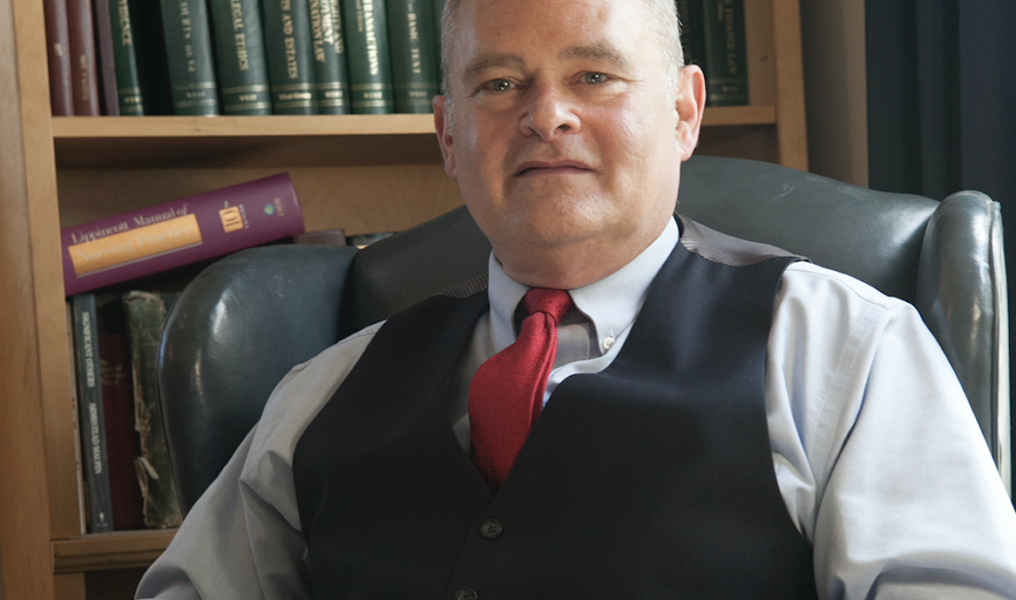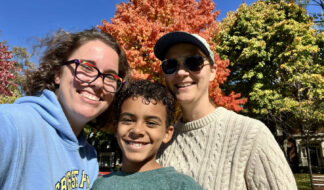As the Aug. 4 primaries get closer, voters will not only choose to vote Democrat or Republican but they'll cast their ballots for nonpartisan positions, too. Rudy Serra is an openly LGBTQ candidate running for 43rd District Judge whose jurisdiction extends through Madison Heights, Ferndale and Hazel Park. In advance of the election, Serra took the time to answer some of BTL's most pressing questions about his priorities should he take office in November.
Why do you think you're a good fit for the office?
I have 2 1/2 years of successful experience doing the job. I have a vocation for public service, a superlative legal education — including representing indigent clients even as a student — and a passion for Justice. I have frequently been a public defender in the Hazel Park court, and I live in the Hazel Park school district. I grew up in the 43rd District, and I was an honors graduate of Ferndale High School — a year ahead of my class. Now, I serve as the president of the board for the FernCare Free Medical Clinic.
My history as a Detroit Judge should provide a new sense of confidence to everyone in the court, that they will be treated fairly, regardless of where they live, or their race, religion, age, disability, sexual orientation or gender identity. I have never been a prosecutor or police officer, so I have no unconscious tendency to identify with people in those roles.
When I ran for reelection, I got over 78,000 votes — more than the entire population of the 43rd District and more than five other judges who kept their jobs — but was defeated by a vicious anti-gay campaign. One of the most important things a judge can have is humility. It takes humility to respect and follow the decisions of other judges as precedent even if you disagree. It takes humility to listen patiently to every person and to behave like a public servant and not a ruler. Few things teach such humility more effectively than losing an election because you're gay, even though you did an exemplary job. I know what it means to experience loss.
I will serve one complete six-year term and will not be eligible to run again. This means I am the only candidate who can serve with no pressure or concern about reelection or fundraising. I will be free to do justice though the heavens fall. Until money for reelection is no longer a factor in judicial selection, I am uniquely invulnerable to them.
What experience do you bring to the table that makes you stand out from the other candidates?
I was the first openly gay Judge in Michigan history. I am the only candidate with over two years of experience as a District Court Judge. I served on the third-busiest trial court in the U.S. [36th District Court, Detroit]. I was rated "outstanding" by the Detroit Metropolitan Bar Association. This means that I am one the best judges or lawyers available for judicial service, and I have a widely acknowledged reputation for fairness, judicial temperament, integrity, competence and diligence.
I have a long record of success as a trial lawyer, in both civil and criminal jury trials. I have litigated multi-million dollar medical and drug cases, and I even forced Parke-Davis [pharmaceutical company] to change its product warnings. I have the skills to protect consumers from industrial exploitation.
I am the only candidate who has ever successfully [called upon] a governor to force them to call a special election to fill a vacant seat. I have the experience to defend our voting rights.
I am the only attorney who successfully sued an extremely right-wing state legislator [Deborah Whyman] for slandering an LGBTQ organization, the Triangle Foundation, and forced her to pay. I have the experience to defend the truth.
I have successfully defended hundreds of LGBT people from wrongful charges. I am the only candidate who has ever presided over a trial. I am the only candidate who has trained five new judges, the only one with a master's degree in communication, and the only candidate with 27 years of experience as a licensed social worker. Judicial experience, communication skills and social work experience are the most useful things a judge can have.
I was the first openly gay person ever nominated for a statewide office in Michigan and the first openly gay member of the Ferndale School Board. I have advanced reining in dispute resolution, and I am the only candidate with a list of professional peer-reviewed publications. I believe I am the only candidate ever to serve on a jury in the 43rd District Court. I drafted and petitioned for the first comprehensive Ferndale Civil Rights ordinance and received death threats by mail and phone. I have the courage to defend our civil rights.
My report to the U.S. Justice Department was published by the Triangle Foundation as "Bag-A-Fag," which is still cited as one of the best sources of legal material on the topic. I served on the Michigan Supreme Court Standard Jury Instructions Committee and as chairman of the Executive Clemency Advisory Council in the Department of Corrections, personally reviewing thousands of requests for pardons, clemency and commutation.
What are your top 3 priorities as judge?
First, to treat every participant fairly and to provide dispassionate justice to all. This includes creating and/or supporting innovative approaches such as "drug court". Since addiction is a disease, we need to develop ways to provide treatment and not just punishment. It is essential that we stop using jail as a mental health ward. It also includes treating every person with dignity and respect. There is no need to criticize an individual's attire or to personally berate them in public. I strive to look everyone in the eye, greet everyone by name and to enable them to feel they have been seen and heard. I strongly support victims' rights, and I believe a judge has a duty to protect victims, the community and the innocent above all.
Second, to provide the people with due diligence. The "clearance rate" — cases resolved within 1 year of filing — at the 36th District Court was around 65% when I began my term. During my service, it rose to over 95%. I did double the average number of jury trials and volunteered for weekend work — reviewing warrants, conducting arraignment — more often than any other judge. I was assigned to supervise all judicial interns, and I helped to select a new magistrate, as well as helping train five new judges, all at the request of the chief judge.
Third, to empower other participants to fulfill their roles with professionalism and not micromanagement. I believe the court staff needs the confidence that the judge supports them. I also believe it is essential to allow lawyers to do their jobs. I do not believe it is possible to select a fair jury if you're never allowed to question prospective jurors. When both sides in a case agree that they need more time, I assume that professionals acting in good faith know what is needed and I generally cooperate. I never had any attempt to exploit my agreeability. Conversely, it is the job of the judge to supervise professional practice in their own courtroom. The judge needs to take seriously claims of impropriety by counsel and not dismiss them as outside the scope of business.
In light of the recent Black Lives Matter protests, many communities are looking closely at criminal justice reform in large ways and small. As a judge, what can you do to promote fairness in your courtroom and more broadly, in the criminal justice system?
Black Lives Matter. I am the only candidate endorsed by the Michigan Democratic Party Black Caucus, and by The Justice Caucus. I recently participated in a demonstration march by criminal defense attorneys against police misconduct and white supremacy. One of the most important things a judge can do is to listen.
I am the only candidate who is a member of the Wolverine Bar Association. I was also a member of the Association of Black Judges of Michigan. I received the Rev. Dr. Martin Luther King Jr. Freedom Award, a Spirit of Detroit Award for civil rights and an Affirmations Community Center Special Thank You for civil rights work. My work also includes being a referee for the Michigan Department of Civil Rights. I wrote The Civil Rights Review for the Wayne State Law Review in 2004.
I will promote fairness by continuing to act on the values shared by these organizations and recognized by these awards and publications. I enjoy public speaking, and I eagerly accept invitations to talk with students and community groups about the law. I would continue to write and speak about the law, and the many things that need to be changed to improve the law. I have a strong preference to avoid giving first offenders a criminal record and I prefer alternatives to jail because I support restorative justice more than retribution. I also support "community policing." I am an Affiliated Consultant with the University of Michigan Health Systems Comprehensive Gender Services Program, and one role of the Open Justice Commission was to help train court officers and others about transgender and other sexual minority issues.
As a person who identifies as LGBTQ, are there particular life experiences that make you feel suited to the position you're running for?
My life experience has convinced me of the importance of life-long learning, listening to the unpopular and maintaining an open mind, humility and patience. I have been a public activist for LGBTQ rights, civil rights, women's equality, universal bodily autonomy — including reproductive rights — and other contemporary issues before it was considered socially acceptable to do so. I have stood up to the establishment, sued police, sued the governor and I've been the target of slander, harassment and threats. I have learned not to be influenced by criticism or hate. As a member of The Ethics Institute at Mercy College, I dealt with some of the most complex questions of modern medical ethics including the right to die. As a member of the National Coalition for Sexual Freedom, I have traveled the country to teach groups about consent and human trafficking issues. The coming out process, self-acceptance, learning to tolerate and appreciate what is different are all important aspects of my gay experience.
Earlier in my life as an openly gay man, I regret that I was unaccepting of transgender people, and I even criticized the transgender community that straight people thought all gay men were "just men who like to dress up as women." Dr. Sandra Cole from U of M taught me the transgender science and medicine that reversed my uninformed prejudice. Rachel Crandall and Susan Crocker have helped to keep my understanding current. Gay history taught me that "The Stonewall Rebellion" was an action largely by transgender people. I now consider myself an advocate for those among the most stigmatized, and most frequently victimized, transgender people — and especially those of color.
What would you like more people to understand about District Courts?
All courts are limited in what they can do. Sometimes they can get you financial compensation for an injury, and sometimes they let you see justice done to a wrongdoer, but no court can change what happened to you. Most of the time courts can't provide you with the vindication you would prefer.
If you face a charge that could result in jail time, you should know that you are entitled to an appointed lawyer in district court, even if you can't afford one. You should also know that some of the finest, most respected attorneys in the community accept District Court assignments, so "Public Defenders" are no less qualified and no less competent than others. At least three of the six attorneys running for judge [including me] also work as public defenders. Many are far better attorneys than some private practitioners.
Your local District Court is the proper place to take neighborhood disputes, problems with local businesses or domestic misconduct. You should always try to settle your disputes without going to court, but if you're not able to do that, vigilante action is never a better answer. District Court is where you should take your complaints about your landlord. It's a better option than walking out on debts or damaging property. District Courts can also refer you to mediation services and other ways to resolve disputes. You should know that if you have an attorney on a District Court matter, hired or appointed, and your lawyer somehow does you wrong — you should tell the judge. Judges have a duty to supervise the professionalism of lawyers in their court.
Finally, you should know that your district judge is an elected official, and you have not just a right, but a duty to scrutinize the hours they keep, the work they do, the decisions they make and the way they treat your neighbors. I would like more people to know about and participate in groups like "court watchers" and I would like more voters to know how important it is to vote on the non-partisan ballot.
Editor's Note: This interview has been edited for length and clarity.










